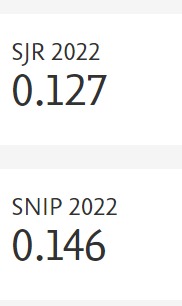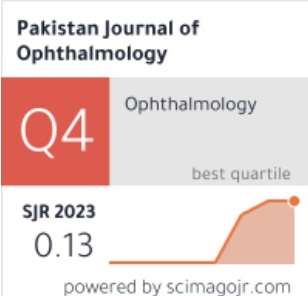Frontalis Suspension for Unilateral Ptosis with Poor Levator Function
DOI:
https://doi.org/10.36351/pjo.v29i1.382Abstract
Purpose: To assess the outcome and complications after frontalis suspension for unilateral ptosis with poor levator function
Material and Methods: Interventional case series of 30 eyes of 30 patients. Patients were selected on non-probability purposive basis from Oculoplasty clinic, Isra Post Graduate institute of Ophthalmology. All the patients with unilateral ptosis with poor levator function were included excluding those having poor Bell’s phenomenon and associated pathology like jaw winking, 3rd nerve misdirection, squint, impaired corneal sensitivity and neoplastic lesions. Patients were diagnosed clinically on the basis of history, old photographs and clinical examination. Preoperative assessment included complete history, ocular and general examination including detailed ptosis examination with proper measurements. Informed consent was taken. Local anesthesia was used in adult patients while general anesthesia was used in children. All patients underwent unilateral frontalis suspension using polypropylene (prolene) 2/0 suture as sling material in a fox pentagon manner. Postoperatively measurements were taken at regular intervals and complications were noted and managed accordingly.
Results: 30 eyes of 30 patients were included in this study. All patients had unilateral ptosis. Age of the patients ranged from 2 years to 41 years (mean of 18.73 years). Nineteen (63.33%) patients were male while 11 (36.66%) were female. Twenty four (80%) eyes had good outcome (within 1 mm of normal), 4 (13.33%) had fair outcome (within 2 mm of normal) and 2 (6.66%) had undercorrection but as the patients were satisfied cosmetically, no second procedure was attempted. Six (20%) eyes had lagophthalmos, which subsided with time without any further sequel. One (3.33%) eyes had knot failure, which was corrected by revising the sling procedure. Exposure keratitis was not noted in any patient as the lid lag was not serious or prolonged. Patients were followed for 2 years and no significant delayed failure or sling material related complication was noted.
Conclusion: Frontalis suspension is an effective procedure for the treatment of unilateral ptosis with poor levator function. Cosmetically acceptable symmetry can be achieved by addressing only the affected eye rather than operating both eyes including the normal eye. It is not associated with any serious complication. It shows promising long term results without any significant cosmetic decline.






